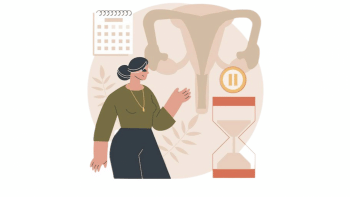It's time we talked about menopause

When I was in my 20s, my mother was going through a physical and mental transition that her family took lightly, unknowingly. In fact, my father was lost as to how to suddenly deal with a depressed wife. She was an emotional bomb about to burst for no reason; those mood swings were the worst besides her lack of sleep and hot flashes.
The family was not supportive of her newfound indifference towards her everyday normal routine, and could not take the cue as a sign of some sort of health crisis. Later, we realised she was going through menopause. She faced a bad spell of hormonal changes, which might not be the case for others as the symptoms vary.
The physiological age for menopause is between 45 and 55 years; many women go through surgical menopause caused by hysterectomy for other health reasons. With menopause comes various bodily irritability, because the production of the female hormone oestrogen and progesterone, at the time, decreases. It is the big drop in oestrogen levels that causes most of the symptoms of menopause.
A woman, from her puberty or menarche to pregnancy and lactation period to perimenopause, menopause, and finally post-menopause stages, lives with and adapts to different levels of hormonal changes throughout her life. These are all part of natural reproductive health. However, these stages have their nuances that need to be sorted.
In my mother's time, a woman's health – and that, too, her menstrual health – was not something to speak about even within her family boundaries. "Periods are normal and hormonal changes are natural, so deal with it" – this was our attitude towards her monthly cycles.
Women need not suffer for these and they must learn to seek medical help. It's also the people around them who need to be empathetic to their mental and physical changes and well-being. The initial physical changes will be scary, but a supportive husband/partner can be extremely helpful in learning to deal with bad tempers, mood swings, and other elements of this natural transition. It is only right to address these symptoms of hormonal changes with tender loving care. It is vital to talk about and listen to her; she needs support and to feel loved and taken care of through this phase of life.
Even women did not know how to address these changes in them – until recently, when they can freely talk about taboo health topics. Thus, our mothers aged quickly and were sad most of the time, while we modern women try to learn and make adjustments as our body demands.
I made sure my husband is aware of my severe, monthly premenstrual syndrome (PMS). Now, when I am going through menopause, he is more patient towards my transition. I cannot help my depressive spells or mood swings and hot flashes, but I am definitely aware of my triggers and the reason why it is happening.
I am better equipped to handle the stress. I meditate, take long hot showers, do some brisk walking or gardening to release the pressure of coping with menopausal hormonal changes. I believe setting some time for myself and doing the things I want helps me adjust to such changes mentally.
The reason I am pointing this out is because, until recently, we as a society were not mindful of a woman's hormonal fluctuations that she deals with daily. You feel hot at one point of the night and have the air conditioner at full blast, and a while later you are in socks and layers of clothing. You feel hot and then cold in the middle of the night, a very common phenomenon in women. The constant brain fog because of lack of sleep affects your daily productivity.
Facing difficulty in sleeping, emotional changes, irritability, mood swings or mild depression are normal for menopausal women, along with racing hearts, headaches, joint and muscle aches and pains, weight gain, hair loss or thinning, and sagging of skin. These experiences are all part of your body adjusting to ageing, and this can last for five to ten years.
Women need not suffer for these and they must learn to seek medical help. It's also the people around them who need to be empathetic to their mental and physical changes and well-being.
You need to learn how to regulate your diet and the foods that trigger certain reactions. The sudden onset of multi-joint pain will force you to start exercising regularly. The adjustments you need to make are mostly about food and exercise, listening to your body, and trying to learn as much as possible about this stage of your life.
The initial physical changes will be scary, but a supportive husband/partner can be extremely helpful in learning to deal with bad tempers, mood swings, and other elements of this natural transition.
It is only right to address these symptoms of hormonal changes with tender loving care. It is vital to talk about and listen to her; she needs support and to feel loved and taken care of through this phase of life.
Raffat Binte Rashid is the features editor at The Daily Star.

 For all latest news, follow The Daily Star's Google News channel.
For all latest news, follow The Daily Star's Google News channel. 








Comments